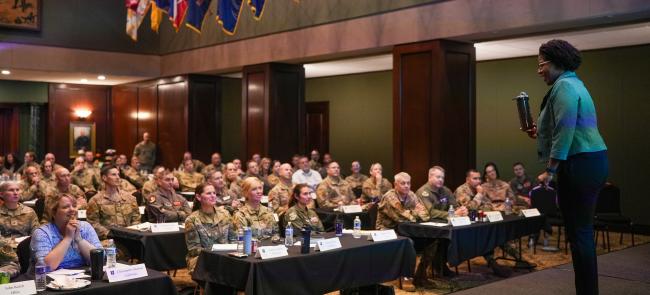
Two adjutants general shared how the Guard purchases goods and services during the annual Doing Business with the Guard workshop Monday at the National Guard Memorial, the NGAUS headquarters in Washington, D.C.
The event was the day before the association’s 23rd Annual Industry Day.
Maj. Gen. Gary Keefe of Massachusetts and Brig. Gen. Jemal Beale of New Jersey headlined a panel discussion. During a 45-minute Q&A, they described the role of adjutants general in the acquisition process and gave tips on how companies can be more visible to Guard leaders.
Keefe said that one way companies can get their products in front of decision-makers is to attend different conferences that the Air and Army Guard holds throughout the year, like the All Hazards Planning Conference at Jackson Barracks, New Orleans, or the annual NGAUS General Conference & Exhibition, which will take place in Boston in 2020.
“A lot of times we’ll see [a product or service] that big Army and big Air Force have has that we don’t have yet. The other way is there is stuff we get through [the congressionally directed National Guard and Reserve Account] that they don’t have,” Keefe said. “The Guard has to buy stuff.”
Retired Command Sgt. Maj. Brunk Conley and retired Command Sgt. Maj. Frank Lever joined Beale and Keefe on the panel. All four men highlighted the importance of getting involved with state associations, and both generals said that businesses that are active with state associations are often more visible on a TAG’s radar.
Although the Guard can be a market for companies, there are also unique challenges when it comes to navigating each state and territory’s acquisition processes. State associations can help vendors meet the right person in a state’s Guard hierarchy to establish a relationship.
“We have 54 different flavors of how we do business,” Beale said, adding that some states and territories have unique missions that fall outside of the federal purview.
Attendees of the panel asked a variety of questions, but many seemed interested in learning more about how to navigate state-specific ethics rules and how to get their products in front of the key decision makers.
The advice, which was echoed from industry partners who have a long history of doing business with the Guard, was to “get engaged.”
“The Guard is a family organization, it’s a smaller organization and they have to spend their money,” Conley said. “Why wouldn’t you go with someone you know and you trust and who shows up and supports your education fund and gives to your best warrior competition and provides services to those airmen and soldiers?”











